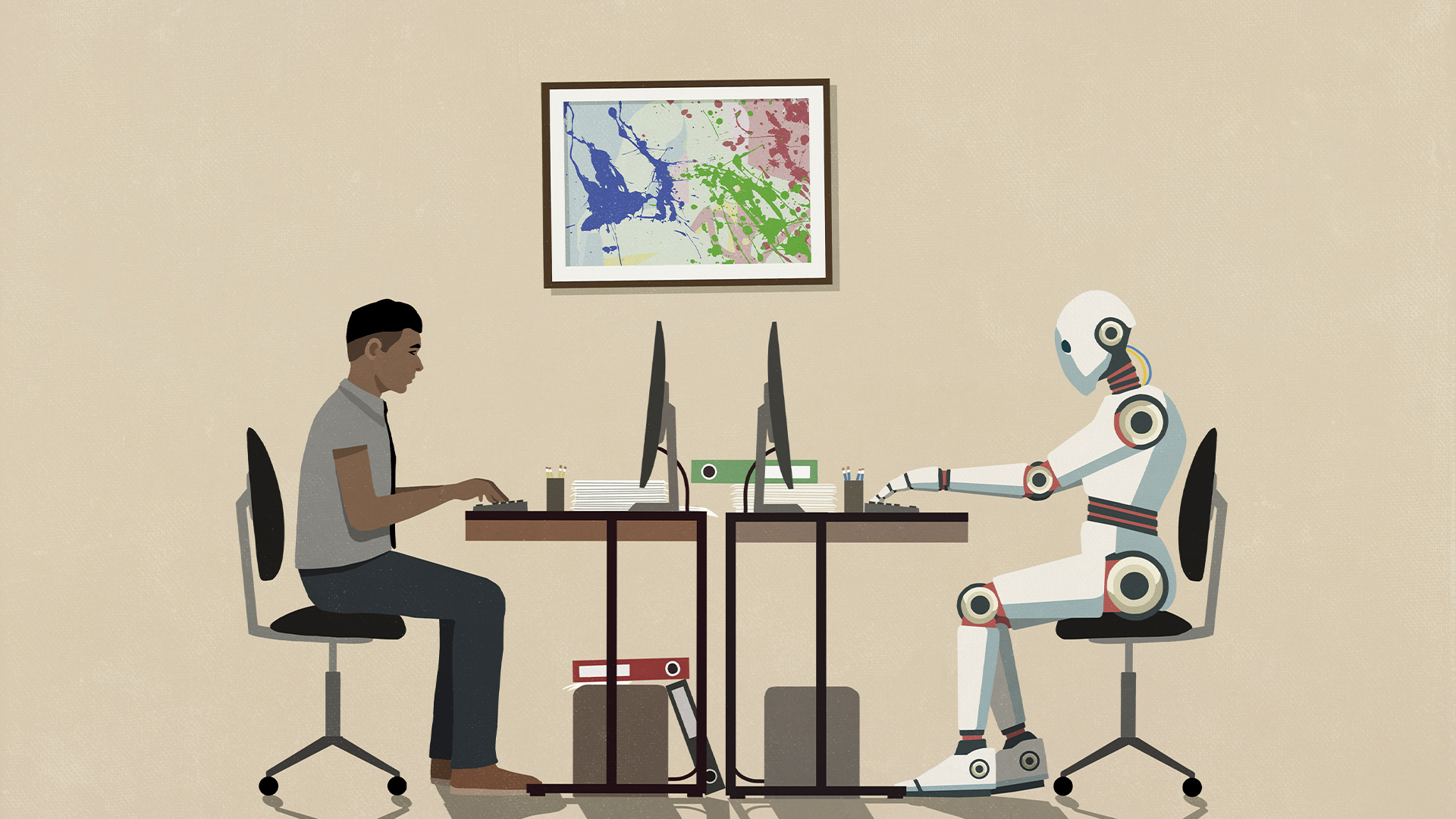Australia's biggest bank cut staff for AI, then it backtracked – and it's one of many scrapping plans for automated customer support teams
Commonwealth Bank of Australia backtracked on job cuts after customer service calls increased following AI rollout


Think AI can manage customer service for your company? By all means, give it a go, but perhaps wait a few months before starting redundancies.
That's the lesson learned the hard way by the Commonwealth Bank of Australia (CBA), which cut 45 jobs in customer service after rolling out an AI bot, only to have to rescind the redundancies weeks later.
The CBA rolled out an AI chatbot – reportedly called Bumblebee – to help manage with customer inquiries, saying the aim was to automate simple requests while freeing up staff to focus on more complicated matters "that need empathy and experience”.
After the bot was introduced, the CBA said at the end of July it would cut 45 customer service roles, insisting they weren't necessary due to a reduction in call volumes by 2,000 a week thanks to the AI tool.
The Finance Sector Union (FSU) said that marked the first time it had been informed of job cuts because of AI.
FSU national secretary Julia Angrisano criticized the move at the time, suggesting workers “want a tech-savvy bank, but they expect to be part of the change, not replaced by it”.
The AI job cuts didn't last
However, the AI bot wasn't delivering the reduction in calls predicted by the CBA. Off the back of information shared by members, the union disputed the CBA's claim that customer service calls were falling, raising a complaint with local regulator the Fair Work Commission.
Sign up today and you will receive a free copy of our Future Focus 2025 report - the leading guidance on AI, cybersecurity and other IT challenges as per 700+ senior executives
"Members told us this was an outright lie and did not reflect the reality of what was happening in Direct Banking," the union said in a statement. "Call volumes were in fact increasing and CBA was scrambling to manage the situation by offering staff overtime and directing Team Leaders to answer calls."
Just weeks later, the CBA rescinded the job cuts and apologized to the 45 customer service staff impacted by the now cancelled redundancies.
The union called the "backflip" a "massive win" but noted that the employees still had to "endure the stress and worry of facing redundancy”. The union revealed it was also gathering information about offshoring or AI-related job losses.
One staffer has opted not to return. After working for CBA for 25 years, Kathryn Sullivan helped test responses to the chatbot – only to be included in the ensuing redundancies.
"Inadvertently, I was training a chatbot that took my job," she said. Sullivan called for the government to "make sure there are adequate regulations to protect people’s jobs, people’s rights."
While the CBA "backflipped" on the job cuts, that isn't stopping the bank from signing a multiyear partnership with OpenAI. The CBA said the aim is to boost scam and fraud prevention as well as offer personalized services to customers.
"We will continue to invest in our people and their AI proficiency so they can better support our customers, while building their skills and experience,” said CBA CEO Matt Comyn.
Enterprises are coming to regret AI job cuts
This isn’t the first instance of businesses issuing a u-turn on AI-related job losses over the last two years. Klarna, for example, boasted it had been able to reduce its workforce significantly as a result of its AI strategy.
The buy now, pay later giant claimed AI was capable of doing the work of around 700 customer agents. However, in recent months the company has scaled back its plans on this front.
Earlier this year, CEO Sebastian Siemiatkowski said Klarna plans to bring on more customer service agents, but not fully reverse its AI strategy. Instead, the chief exec envisages a setup where consumers can opt for basic, AI-powered customer support options, or choose a premium service where human staff are available.
Klarna and the CBA aren’t alone on backtracking, either. Research in May 2025 found that half of companies intended to abandon plans to replace customer support workers with AI by 2027.
Notably, a third of UK tech leaders admit they’d already cut staff in favor of the technology, but have since come to regret these redundancies.
More than half (55%) of those who cut staff admit they acted too hastily, and are now facing acute internal talent shortages.
Make sure to follow ITPro on Google News to keep tabs on all our latest news, analysis, and reviews.
MORE FROM ITPRO
Freelance journalist Nicole Kobie first started writing for ITPro in 2007, with bylines in New Scientist, Wired, PC Pro and many more.
Nicole the author of a book about the history of technology, The Long History of the Future.
-
 Hackers are using LLMs to generate malicious JavaScript in real time
Hackers are using LLMs to generate malicious JavaScript in real timeNews Defenders advised to use runtime behavioral analysis to detect and block malicious activity at the point of execution, directly within the browser
-
 Developers in India are "catching up fast" on AI-generated coding
Developers in India are "catching up fast" on AI-generated codingNews Developers in the United States are leading the world in AI coding practices, at least for now
-
 Business leaders are using AI as a “license to reduce headcount” – new Morgan Stanley research lays bare the impact on UK workers
Business leaders are using AI as a “license to reduce headcount” – new Morgan Stanley research lays bare the impact on UK workersNews Analysis of five sectors highlights an "early warning sign" of AI’s impact on jobs
-
 Lloyds Banking Group wants to train every employee in AI by the end of this year – here's how it plans to do it
Lloyds Banking Group wants to train every employee in AI by the end of this year – here's how it plans to do itNews The new AI Academy from Lloyds Banking Group looks to upskill staff, drive AI use, and improve customer service
-
 CEOs are fed up with poor returns on investment from AI: Enterprises are struggling to even 'move beyond pilots' and 56% say the technology has delivered zero cost or revenue improvements
CEOs are fed up with poor returns on investment from AI: Enterprises are struggling to even 'move beyond pilots' and 56% say the technology has delivered zero cost or revenue improvementsNews Most CEOs say they're struggling to turn AI investment into tangible returns and failing to move beyond exploratory projects
-
 Companies continue to splash out on AI, despite disillusionment with the technology
Companies continue to splash out on AI, despite disillusionment with the technologyNews Worldwide spending on AI will hit $2.5 trillion in 2026, according to Gartner, despite IT leaders wallowing in the "Trough of Disillusionment" – and spending will surge again next year.
-
 A new study claims AI will destroy 10.4 million roles in the US by 2030, more than the number of jobs lost in the Great Recession – but analysts still insist there won’t be a ‘jobs apocalypse’
A new study claims AI will destroy 10.4 million roles in the US by 2030, more than the number of jobs lost in the Great Recession – but analysts still insist there won’t be a ‘jobs apocalypse’News A frantic push to automate roles with AI could come back to haunt many enterprises, according to Forrester
-
 Businesses aren't laying off staff because of AI, they're using it as an excuse to distract from 'weak demand or excessive hiring'
Businesses aren't laying off staff because of AI, they're using it as an excuse to distract from 'weak demand or excessive hiring'News It's sexier to say AI caused redundancies than it is to admit the economy is bad or overhiring has happened
-
 Lisa Su says AI is changing AMD’s hiring strategy – but not for the reason you might think
Lisa Su says AI is changing AMD’s hiring strategy – but not for the reason you might thinkNews AMD CEO Lisa Su has revealed AI is directly influencing recruitment practices at the chip maker but, unlike some tech firms, it’s led to increased headcount.
-
 Accenture acquires Faculty, poaches CEO in bid to drive client AI adoption
Accenture acquires Faculty, poaches CEO in bid to drive client AI adoptionNews The Faculty acquisition will help Accenture streamline AI adoption processes
